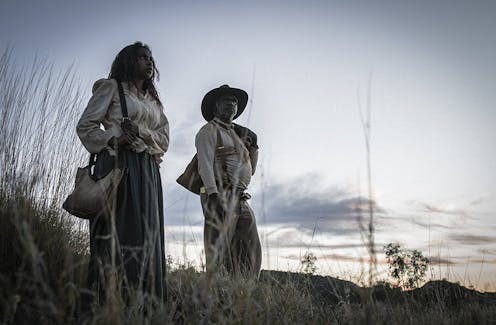Warwick Thornton's Sweet Country: a tragic investigation of race on Australia's frontier
- Written by Lucio Crispino, School of Communication, International Studies and Languages, University of South Australia

The opening of Warwick Thornton’s Sweet Country (2017) is as prosaic as it is poetic. A battle-scarred billy on a roaring campfire has come to the boil. Into its churning depths an unidentified hand drops a palmful of tea, followed by two more of sugar. Just enough to sweeten its otherwise pungent bitterness.
Off-screen, from what feels to be another time and space, we hear a wildly enraged whitefella insulting an all-but-silent blackfella. The taunt “black bastard” is barked with undiluted contempt. Over the course of the film, this pointed juxtaposition of sound and image will be used, in concert with a series of fleeting flashbacks and flashforwards, to both layer and unfold an acutely tragic narrative.
Thornton’s sensitively scripted story, which draws on the conventions of the western, is simple. Its social and ethical implications, though, are not. In self-defence, an Indigenous man, Sam Kelly (Hamilton Morris) shoots and kills a local landowner, Harry March (Ewan Leslie).
Only later, while they are on the run, does Kelly learn that March raped and impregnated his wife, Lizzie (Natassia Gorey-Furber). After they return and surrender themselves, this information has a decisive impact on the outcome of his trial and its traumatic aftermath.
In their film, set in the 1920s in the Northern Territory, Thornton and his scriptwriters generate a great deal of complexity from a relatively straightforward plot. For example, although the landowner for whom Kelly and Lizzie work, Fred Smith (Sam Neill), says he regards them as equals, this does not prevent him from “loaning” them to March and, in doing so, considering himself a good Christian. Likewise, March’s “borrowing” of them to help him work his land is clearly motivated more by a compulsion to abuse and terrorise them than a genuine need for their labour.
To complicate matters further, the roots of his pathological thirst for cruelty appear to lie in the deep psychological damage caused by years spent fighting in the nightmarish trenches of the first world war. It could even be argued that Kelly, long before March threatened him at gunpoint, was already at war with him and his ilk. This is a fact vividly magnified by the fatal encounter between Sergeant Fletcher’s (Bryan Brown) posse and a party of “undomesticated” Aboriginal warriors.
Impressive as they are, these are by no means the film’s greatest or most memorable cinematic subtleties. Sweet Country’s finer moments undoubtedly belong to its intelligent mise en scène; its unflappable trust in action as a means of telling, not just showing; and, last but not least, its delicate deformations of narrative flow and direction.
For instance, I cannot recall a single scene in which the landscape was merely a convenient backdrop or decorative setting for the actor’s bodies, gestures and dialogue. Even the light and weather that sculpt and animate its sublime, occasionally menacing immensity play an indispensable role in shaping the dramatic highs and lows of Thornton’s taut, but mercurial narrative.
Fletcher’s gruelling attempt to traverse the blistering surface of a blinding salt lake without assistance is unforgettable in this regard. Indeed, nothing sums up his not being in accord with the land he and his fellow invaders want to possess and dominate than his near death in this virtually wordless sequence. Kelly, who is in accord with it, rescues him.
Most impressive of all, however, is the film’s sparing (but potent) use of flashbacks and flashforwards. Thornton and his editor, Nick Myers, employ these to embody the partially abstract notion of historical consequences. By evoking the past or the future of a particular thought or act, they make visible a process that is sometimes hard to grasp, even when it is beyond doubt. To present the seed or fruit of a particular situation while it is still unravelling is to highlight its ethical dimension, to undermine its inevitability. We rarely see this kind of synchronicity between form and philosophy in Australian cinema.
That said, to my mind, Thornton’s widely lauded Samson and Delilah (2009) evinces a somewhat more uncompromising attitude towards the corrosive impact of British colonialism and European Christianity. This is because Sweet Country’s cultural and political authenticity, as it were, is affected by the fact that it features two internationally recognisable actors and draws on a Hollywood genre for its iconography. Fortunately, only in a handful of instances do these constitute a distraction of any real significance.
In truth, for me, there were many payoffs with respect to its powerful reworking of the outback western. Chief among these was a possible – tantalising – connection between settler Mick Kennedy’s (Thomas M. Wright) watermelons in Sweet Country and Tom Doniphon’s (John Wayne) cactus roses in John Ford’s The Man Who Shot Liberty Valance (1962). Both represent a point of collision between one world and another. Our task, as viewers, is to turn collision into crossover.
Sweet Country premiered in Australia at the Adelaide Film Festival. It will be released generally in 2018.
Authors: Lucio Crispino, School of Communication, International Studies and Languages, University of South Australia




